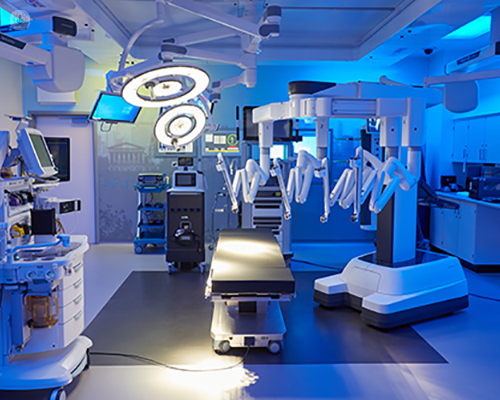Navigating prostate cancer: The rise of robotic prostatectomy in modern medicine
Written by:In the realm of modern medicine, technological innovations have continually revolutionised surgical procedures, providing patients with safer and more effective treatments. Robotic prostatectomy, a cutting-edge surgical technique, has emerged as a transformative approach for treating prostate cancer. In his latest online article, Mr Peter William Cooke explores the key aspects of robotic prostatectomy, its benefits, and the impact it has on the field of urology.

Understanding robotic prostatectomy:
Robotic prostatectomy is a minimally invasive surgical procedure designed to remove the prostate gland in cases of prostate cancer. Unlike traditional open surgery, which involves a large incision, robotic prostatectomy employs a robotic surgical system to perform the operation through several small incisions. The da Vinci Surgical System, a leading robotic platform, is commonly used in this procedure.
How It works:
The da Vinci Surgical System consists of a console for the surgeon, robotic arms with surgical instruments, and a high-definition 3D vision system. The surgeon sits at the console and controls the robotic arms, which mimic the surgeon's hand movements with precision. The 3D vision system provides a magnified and detailed view of the surgical site, enhancing the surgeon's ability to perform intricate manoeuvres.
Benefits of robotic prostatectomy:
- Minimally invasive: Robotic prostatectomy is a minimally invasive procedure, resulting in smaller incisions, reduced blood loss, and a quicker recovery compared to open surgery.
- Precision and dexterity: The robotic system offers enhanced precision and dexterity, allowing surgeons to navigate complex anatomical structures with greater accuracy.
- High definition 3D vision: This is particularly important to identify and preserve the intricate nerves and muscle structures surrounding the prostate responsible for sexual function and urinary continence.
- Reduced complications: With smaller incisions and precise control, the risk of complications such as infection and postoperative pain is minimised.
- Quicker recovery: Patients undergoing robotic prostatectomy often experience a faster recovery, shorter hospital stays, and a quicker return to normal activities.
- Improved outcomes: Studies suggest that robotic prostatectomy yields comparable cancer control outcomes to traditional open surgery while providing the aforementioned advantages.
Challenges and considerations:
Despite its numerous advantages, robotic prostatectomy does pose some challenges. The cost of the robotic system and the need for specialised training for surgeons are factors that need to be considered. Additionally, access to robotic surgery may be limited in certain regions, hindering widespread adoption.
The future of robotic prostatectomy:
As technology continues to advance, the field of robotic surgery is likely to evolve further. Improvements in robotic platforms, artificial intelligence integration, and telemedicine may enhance the capabilities of robotic surgery and increase its accessibility globally.
Mr Peter William Cooke is a respected urologist with over 35 years of experience. You can schedule an appointment with Mr Cooke on his Top Doctors profile.


